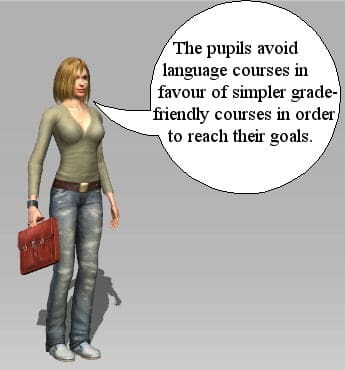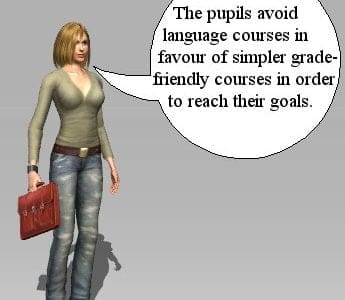 The web is today the primary
The web is today the primary![]() source of communication for contacts over national borders. Linguistic walls that could be an obstacle are teared down with imagery as well as English, lingua franca of the new age. However, this development shows several linguistic gaps, both qualitative, generation-related as well as the refusal to learn foreign languages other than English.
source of communication for contacts over national borders. Linguistic walls that could be an obstacle are teared down with imagery as well as English, lingua franca of the new age. However, this development shows several linguistic gaps, both qualitative, generation-related as well as the refusal to learn foreign languages other than English.
English knocks out other languages
”English knocks out other languages” is the title of an article by Viveca Brozin-Bohman. According to an attitude survey with primary- and secondary school pupils in Sweden, they think that excellent language skills in English are enough besides Swedish. Administration, principals, teachers and parents respond that good knowledge in English is absolutely necessary while other languages also have some value. There are many reasons for this attitude. The most important reason, according to the author, is that language skills are valued too low in the competition for desirable secondary school- and university courses. The pupils avoid language courses in favour of simpler grade-friendly courses in order to reach their goals.
Globalisation, ICT and language
However, there are more reasons for the exclusive position of the English language, which Henrik Hansson, researcher at the Institute of International Education, Stockholm University and Sylvia van de Bunt-Kokhuis, researcher at Haagse Hogeschool in Hague, put forward in the report ”E-learning and language change – Observations, tendencies and reflections”.
The report analyses the globalisation of e-learning and how ICT (information and communication technologies) effect linguistic changes, as well as the position of the English language as the lingua franca and its effects on other languages. In the next part of this series of articles I will dig deeper into this research with focus on linguistic transformation and terms like globespeak, cyber-codes and learning.
Written by LarsGoran Bostrom©
Sources:
”E-learning and language change – Observations, tendencies and reflections” by Henrik Hansson and Sylvia van de Bunt-Kokhuis
”Engelskan knockar övriga språk” av Viveca Brozin-Bohman i Lärarnas Tidning nr2/2005
Opens in a new tab



